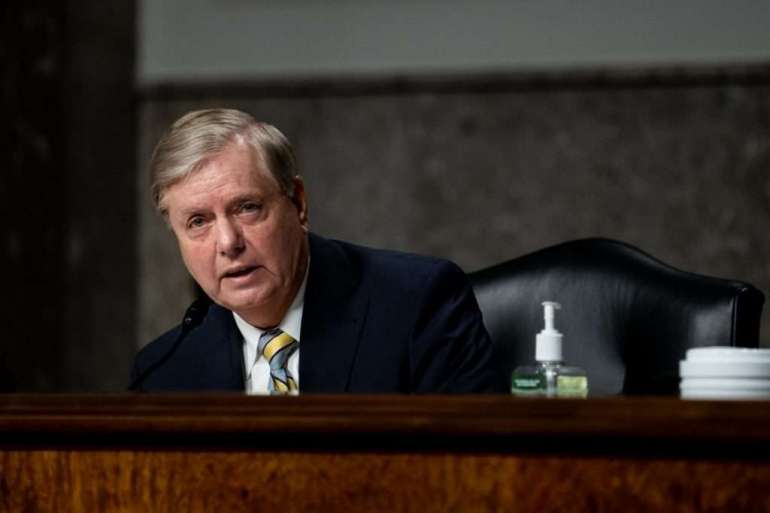Senate Republicans bet it all on the Supreme Court — again

Sen. Steve Daines (R-Mont.), who is facing popular Democratic Gov. Steve Bullock this year, said the Supreme Court vacancy distills the race to “a very clear choice” for voters.
“It’s going to help. People are motivated,” added Sen. Joni Ernst (R-Iowa), who sits on the Senate Judiciary Committee and is facing a stiff challenge from Democrat Theresa Greenfield.
A quick confirmation vote may be an unpopular decision among the broader public: Fifty percent of those surveyed in a recent POLITICO/Morning Consult poll said the presidential election winner should pick Ginsburg’s successor, while 37 percent said Trump should fill the seat. New York Times polls in battleground states showed that voters prefer that Biden make a Supreme Court pick over Trump.
But Senate races are being fought largely in GOP-leaning territory and party officials think the vacancy may be a boon to many Republicans’ chances. The states with GOP incumbents facing potential danger include Colorado, Arizona, Maine, North Carolina, Iowa, Montana and Georgia.
Dan Eberhart, a GOP donor, said the vacancy “helps on the margins. But in some of these races that’s a big deal.”
“It helps candidates that were running behind Trump and hurts ones that were running better than Trump,” Eberhart said. “It hurts people like Cory Gardner and Susan Collins. I think it helps people like [Thom] Tillis, [Martha] McSally and Ernst.”
Gardner of Colorado and Collins of Maine are the only two GOP senators running for reelection in states that Trump lost; Collins opposes filling Ginsburg’s seat this year and Gardner is in line with McConnell. The rest of the party is fighting for reelection in states that Trump won, though some — like Arizona, North Carolina, Georgia and Texas — are becoming more fertile territory for Democrats.
“It obviously energizes the left, very much. The first two, Gorsuch and Kavanaugh, didn’t change the balance of the court. This one in all likelihood will,” said Sen. John Cornyn (R-Texas), who is up for reelection against Democrat MJ Hegar. “I’m not sure who it hurts and who it helps.”
And even though Democrats were unable to use the GOP’s 2016 blockade of Garland to their electoral advantage, they believe McConnell’s maneuver so close to the election is too craven to be lost on the electorate this time around.
“The American people do not want to see Mitch McConnell and Donald Trump go forward and steal a second Supreme Court seat,” said Sen. Elizabeth Warren (D-Mass.). McConnell “is going to a place that is contrary to what people want.”
In justifying their decision to move on a Supreme Court nomination this year, Republicans have pointed to the 2018 midterm elections, when the GOP slightly expanded its Senate majority after four Democratic senators who voted against Kavanaugh a month earlier were defeated. And the one Democrat who voted for Kavanaugh — Sen. Joe Manchin (D-W.V.) — was reelected in his ruby-red state.
“Recent history has clearly shown that these sorts of fighting bring Republicans together,” said Sen. Todd Young (R-Ind.), chairman of the Senate GOP’s campaign arm, who gave state-by-state presentations to the party on Tuesday. “And I anticipate that will happen in 2020, just as it did in 2016 and 2018.”
But Democratic Sen. Jon Tester won reelection in 2018 in conservative Montana after voting against Kavanaugh; Sen. Kyrsten Sinema (D-Ariz.) beat McSally after coming out against Kavanaugh, as did Democratic incumbents from Pennsylvania, Michigan, Ohio and Wisconsin — all states Trump won in 2016.
“They won a mandate in 2018? They lost the frickin’ House,” Tester said in an interview. “They’re making excuses for something that they know is totally corrupt.”
Marianne LeVine and James Arkin contributed to this report.